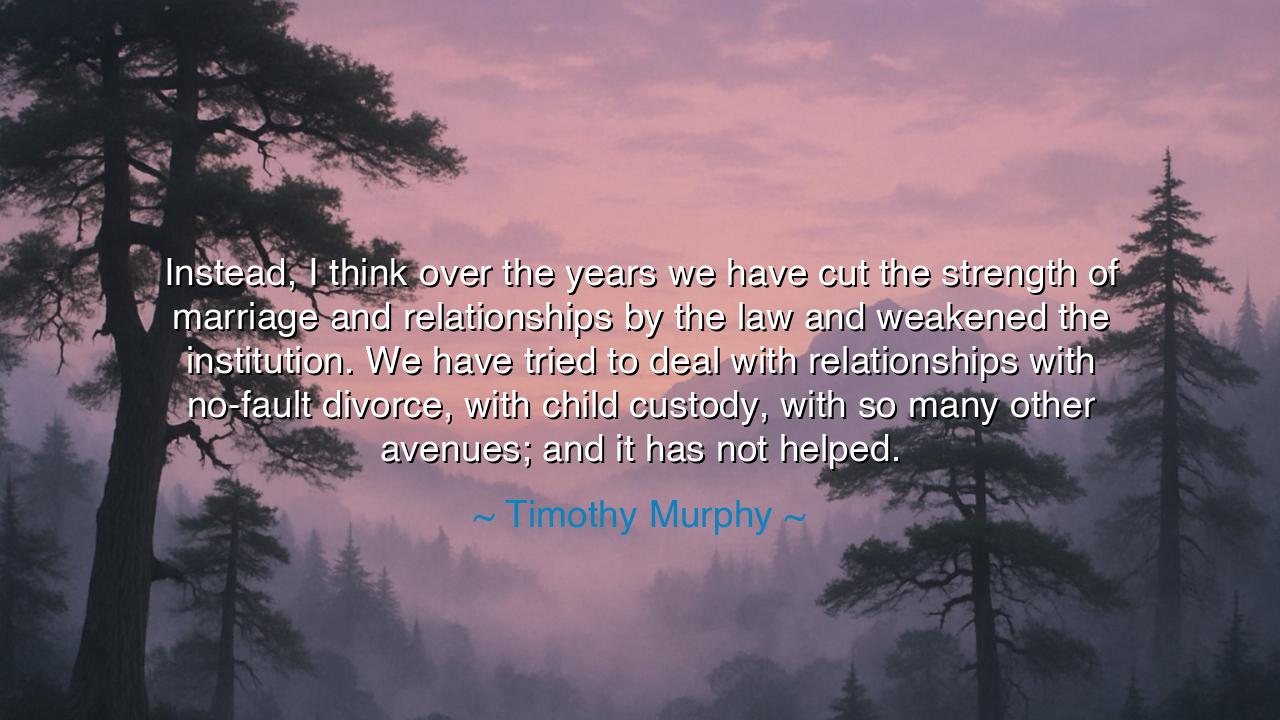
Instead, I think over the years we have cut the strength of
Instead, I think over the years we have cut the strength of marriage and relationships by the law and weakened the institution. We have tried to deal with relationships with no-fault divorce, with child custody, with so many other avenues; and it has not helped.






“Instead, I think over the years we have cut the strength of marriage and relationships by the law and weakened the institution. We have tried to deal with relationships with no-fault divorce, with child custody, with so many other avenues; and it has not helped.” — Thus spoke Timothy Murphy, reflecting not only on the laws of his age, but on the condition of the human heart itself. His words carry both lament and warning, for they arise from the recognition that what once bound souls together in sacred union has, in time, been reduced to contracts and clauses. Through this statement, Murphy does not merely speak of law, but of the spirit of a society that has traded commitment for convenience, and depth for expedience.
To understand the origin of this quote, we must look to the modern reshaping of marriage in the latter half of the twentieth century. In an age of growing individualism and reform, nations across the world sought to make divorce simpler — introducing no-fault divorce, a system that allowed couples to separate without accusation or proof of wrongdoing. Its purpose was mercy: to end bitter trials, to free those trapped in misery. Yet, as Murphy observes, in liberating the body, the law may have loosened the spirit. For when the unbreakable bond of marriage becomes dissolvable by ease, its meaning, too, begins to dissolve.
In earlier ages, marriage was not merely a contract between two individuals, but a covenant — a bond of honor and endurance. The ancients, whether in the temples of Greece, the courts of Rome, or the villages of old Christendom, saw in marriage a reflection of something divine: the union of opposites that gave life, order, and strength to the world. It was not meant to be without struggle, for love itself was seen as a discipline, a sacred work. Yet modern laws, seeking to spare suffering, have sometimes stripped marriage of its sacred gravity, transforming it from vow to transaction, from lifelong promise to temporary arrangement.
Murphy speaks, too, of child custody, that painful battlefield where the innocent become the casualties of adult conflict. In striving to legislate fairness, society has often overlooked the deeper truth — that a family cannot be healed by law alone. When relationships break, courts may divide property, assign guardianship, and measure visitation in hours and minutes, but they cannot mend the wound in the child’s heart. The law may seek justice, but it cannot restore unity. Thus, Murphy’s lament: that we have turned to the language of litigation to resolve what was once the work of love, patience, and forgiveness.
History itself bears witness to this decline. Consider the Roman Empire, where the sanctity of marriage once upheld the strength of society. As wealth and pleasure grew, the Romans too made divorce easy, marriage optional, and family secondary. Historians like Tacitus wrote that the empire’s decay began not on the battlefield, but in the home. When the hearth grew cold, the nation’s heart grew weak. And so, too, does Murphy’s warning reach beyond his own time — reminding us that when the institution of marriage falters, so too does the moral structure that binds a people together.
Yet, this is not a call to despair, but to renewal. For the strength of marriage cannot be restored by law alone — it must be rekindled by the human will, by the choice to love not only when love is easy, but when it is hard. The remedy to broken relationships is not found in legislation, but in the rediscovery of commitment, forgiveness, and sacrifice. If society has weakened marriage through law, then it must rebuild it through virtue — by teaching the young that love is not merely a feeling to be pursued, but a covenant to be honored, a daily act of courage and grace.
And so, O listener, take this wisdom to heart: do not let the convenience of the age erode the sanctity of your bonds. Let your promises be sacred; let your love endure beyond the storms. For the laws of nations may change, but the laws of the soul remain eternal — that true strength lies not in freedom from obligation, but in faithfulness to it. If you would build a lasting world, begin by building a faithful home. Let the heart be the altar, and commitment the offering; for only then will the institution of marriage, and with it the fabric of society, regain its strength and purpose once more.






AAdministratorAdministrator
Welcome, honored guests. Please leave a comment, we will respond soon